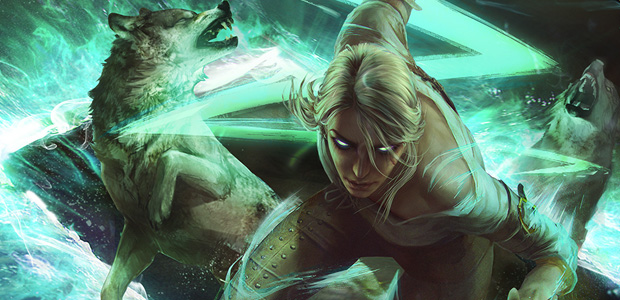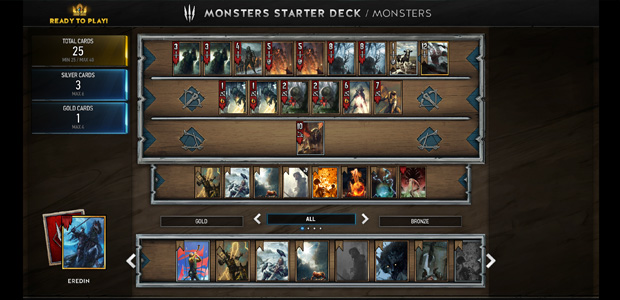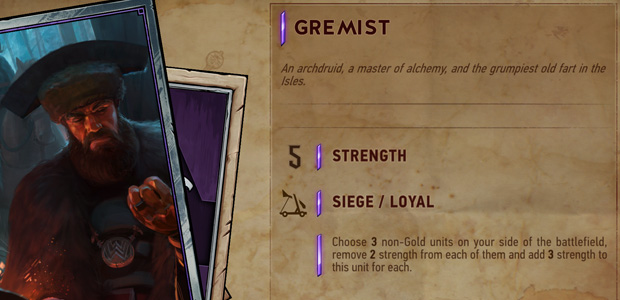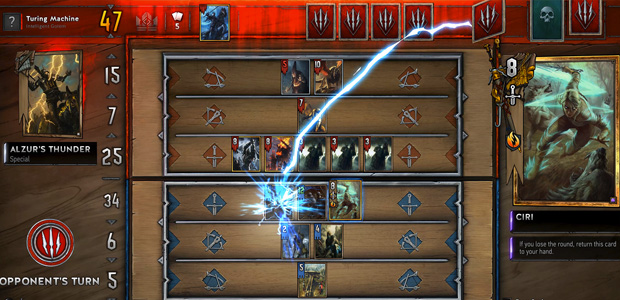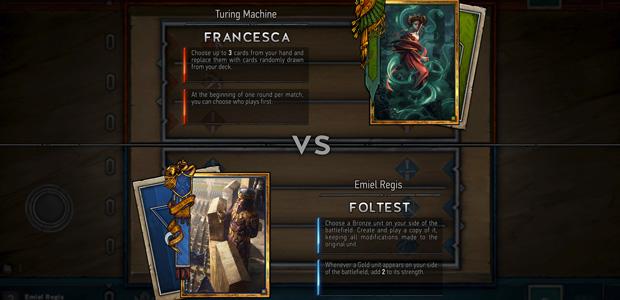The RPG Scrollbars: A Round Of Gwent
Play The Witcher's cards right
These days it seems like you're not a true RPG unless you've got a card-game spin-off. Hearthstone. The Elder Scrolls Legends. Dark Souls Strip Poker. (Coming soon! And the rules are painfully simple. First, strip. Then comes the poker! Repeat! Again!)
The reason is of course entirely down to the opportunity to expand the world and find a new take on the characters, and nothing whatsoever to do with Blizzard proving that a successful attempt is a license to print money, to the point that the most ridiculous of games are giving it a try. Still, the two genres have had a longer history than you might think, from the original World of Warcraft trading card game, to Final Fantasy's Triple Triad, to Might and Magic's Arcomage. Much like Gwent, it began as something to kill time with in its game's taverns before being spun off into its own thing. Unlike Gwent, nobody cared. Even in Closed Beta, I can see lots of people caring about Gwent.
Part of the problem with reviewing The Witcher 3 was having to blaze through it, which means Gwent wasn't really part of my experience first time through. Some 30 hours of one of the best RPGs ever didn't leave a lot of time for gathering cards and wondering how Ciri had managed to cover her tracks so well despite being famous enough to have been immortalised as a Gwent card, or if Geralt felt a bit odd about someone else playing him in the middle of a game. Still, Gwent was huge - replacing the previous game's tedious Dice Poker with something that made better use of the characters than the first game's sex cards, and rules so simple that the designer supposedly came up with them in the bath. (Critics have accused it of just being a reskinned version of a game called Condottiere, but I've never even heard of that, never mind played it, so I can't comment. My card game experience begins and ends with old Sierra adventures, which at least were usually polite enough to let you save/restore.)
Gwent becoming a standalone game was all but guaranteed. Still, just porting it into its own app wouldn't be enough, not least because part of its implementation in The Witcher 3 revolved around Geralt slowly getting the best cards during his travels and so rolling the other players over by the end of the game. You're meant to be the best, the very best, like no-one ever was. So, it's been a while coming. The Closed Beta admits to not being there yet, with lots more cards and tweaks still to be done, but it certainly feels more like a real game than what I finally managed to play of its predecessor.
Top of the things to come list is that much as The Witcher 3 was an RPG with a card-game in it, Gwent is going to be a card-game with an adventure in it, with the writer of the Bloody Baron storyline from the main game working on proper narratives that will hopefully carry on the same Pokemon exploration vibe to spice things up, rather than just be a quick sop to story like Hearthstone's jokey encounters and The Elder Scrolls Legends' really dull ongoing story. Honestly, I'd totally be up for a Gwent where the single-player and multiplayer were separate entities entirely, so that the adventure could dole out cards like The Witcher 3 did, though I doubt that'll be the case. Needless to say, at the moment you acquire them in the usual ways - buying 'kegs' (really?) of cards with real money or Not Gold, milling unwanted ones into Not Arcane Dust, and using that to craft the ones you want after drawing your tenth Sen'jin equivalent.
In case you've not played The Witcher 3 or just skipped Gwent, here's a quick breakdown. Gwent is a card game for two players, with decks of between 25 and 40 cards. Each is aligned to a prominent faction - the Northern Realms, Scoia'tael, Skellige or Monsters, with Nilfgaard coming soon. Each faction has its own set of cards, along with a unique bonus. Monsters, for instance, keep a random unit on the board between rounds. Skellige buffs every card played at the end of a round.
The board has three rows for each side, representing melee, ranged and siege units. Unlike Hearthstone, there's no mana requirement to play cards. All you have to do is play your cards as you see fit, boosting your 'Strength'. Whoever has the highest Strength at the end of the round wins it. Each game is a best of three. Simple, yes?
Where things get more complex is how the cards interact with each other and the deck. Playing a Fog card for instance will reduce most Ranged unit's strength to 1. However, it might also summon Foglets for a player with a Monster deck. Another card might add Strength to any unit that loses it, which synchronises with units that arrive on the battlefield damaged. Other units can attack cards and lower their strength. Others promote them. Another might pull things from the deck regardless of what's in your hand. Others still pull from the graveyard, meaning that sometimes it's worth sacrificing your own card to bring it back buff. There are even cards you play on your opponent's side, trading giving them Strength for some other advantage later. Kambi for instance is 3 free Strength, but after 3 turns, summons a unit called Hemdall (no typo!) that obliterates all non-Gold units on the whole battlefield.
And then there's the biggest challenge of all. Despite games being best two out of three, you don't redraw between rounds. You get a couple of extra cards in your hand, but for the most part what you pull at the start of the game has to last you, meaning that it's a waste of resources to try and obliterate an opponent. Indeed, Passing is a crucial tactic. The catch is that when one player Passes, the other can play as many cards as they like, forcing you to decide when it's worth pushing for a win, or sacrificing a round to be in a better position for the next two.
Even in Closed Beta, it works well. Games are fast, fluid, and importantly, nothing like Hearthstone. The need to think about the bigger picture adds a fantastic psychological element to the action, while the number of cards at your disposal from the start and how much they interact with both the deck and the graveyard adds a whole new dimension to that game's focus on ramping up and card draw. It's more like having an army than individual heroes, and determining when best to drop the hammer rather than waiting for your chance to do that.
There's also a couple of cute features that speak to CD Projekt's usual attention to detail, with my favourite being to send a 'GG' to the other player at the end of a round. This gives them a tiny resource boost - just a few flecks of gold - but is a nice way of both rewarding a good opponent and something to feel smug about withholding if they've been the kind of dick that just wants to run the timer out when you both know they've lost. The downside is that right now, there's no quests to reward simply playing the game and make it easy for good and bad players to keep slowly building up their collections for free - if you lose, it may as well play the old Willy Wonka clip.
My only real problem with it though is the same I had with Elder Scrolls Legends - the cards themselves have very little personality. Oh, they have recognisable names and faces and audio-clips and animations if you zoom in, but very few of them do anything particularly exciting. Take 10 Strength from this. Take 2 Strength from that. Promote a unit to Gold. That kind of thing. Part of the joy of Hearthstone is seeing what crazy stuff Blizzard comes up with, especially for its recognisable characters and Legendaries. Here... well, here's The Witcher 3's main crew. Geralt - 12 Strength. Triss - 8 Strength, Remove 4 Strength from 1 Enemy Unit. Yennefer at least spawns one of two units that either adds or removes 2 strength to all other units on the battlefield and Ciri returns to your hand if you lose the round, but still... not very exciting. Glancing through the cards, the only one that gave me a 'Oh, come on!' was the Bloody Baron, not for being powerful, but for his ability being to spawn a Botchling or a Lubberkin.
I mean... damn. Talk about rubbing it in, guys.
There's still plenty of potential for interesting, tactically distinct decks of course, and decks full of intricate synergies. I just miss the raw excitement of unlocking something like Dr Boom or Deathwing or Sludge Belcher - that sense that, whatever the state of the meta, the game just changed for your deck. Long-term, this is almost certainly the best approach for the game, admittedly. As someone who will only ever, ever play casually though, I'd like more cards to eagerly aspire to and more short-term drama. Again, it'd be nice to think that the single-player mode will be separate enough from the multiplayer to allow some unbalancingly cool cards with crazy effects - a Gaunter O'Dimm who lets you make one of three wishes, each with a downside, for instance, or an Angry Sorceress who slings random spells around like Yogg Saron. Fun cards with heavy RNG factors for players that like them, while keeping things generally more balanced and sensible for multiplayer rounds. Probably won't be the case, but hey, I'd be all for it. Whatever happens, I trust CD Projekt to do the Witcher universe proud.
As said, this is the Closed Beta. You can sign up to request a ticket right here, though it's unlikely to be too long before things open up. Alternatively, fire up the main game and challenge a few NPCs to a round. At this point I was going to add that if you really can't get enough, try the Hearts of Card mod, which replaces all of that boring old swordfighting with card game battles. Sadly, the creator didn't get too far into it before getting bored, and it looks like it's not compatible with the current version. Perhaps the interest in Gwent will inspire someone else to pick up the pieces? The Witcher 3 may be over, but it's still got some life in it left. More on that - fingers crossed - next week...
And now to see how many hundreds of people care about Arcomage.


